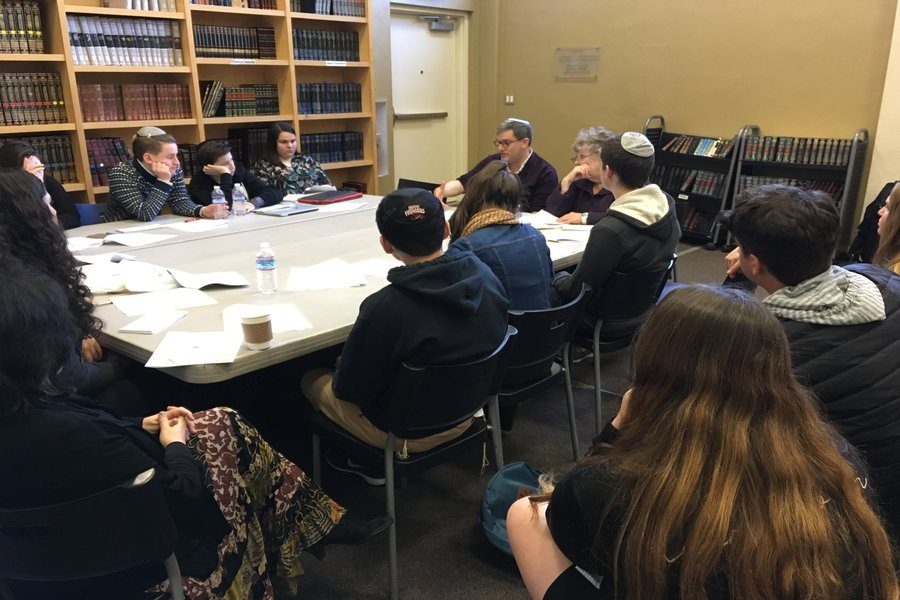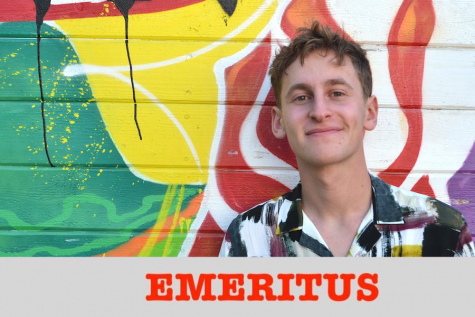Fourth JSPA conference tackles conflict of interest and criticism of news media
STUDY: Attorney Joseph Lipner applied the First Amendment to school newspapers in his talk, titled Freedom of the Press in Religious High Schools, in the Beit Midrash of B’nai David-Judea.
April 5, 2017
During election season last fall, people were putting up signs and stickers, but Mrs. Kathleen Neumeyer did not.
As she explained at a workshop Jan. 5, the former adviser of the Harvard-Westlake Chronicle was being careful to avoid any appearance of conflict of interest.
“A friend of mine was running for office, and he handed me a bumper sticker to put on my car,” Mrs. Neumeyer as she started her workshop. “But, I was not able to put it on my car because it was a conflict of interest.”
Titled “Who, Me? Conflict of Interest in High School Journalism,” her talk was part of the fourth annual convention of the Jewish Scholastic Press association, which met for three days at B’nai David-Judea Congregation.
Students came from Shalhevet, Milken and YULA high schools in Los Angeles, along with Kushner Yeshiva High School of New Jersey and Goldie Margolin High School for girls in Memphis, Tenn.
Mrs. Neumeyer said writing for the student paper and being a part of the student government falls under conflict of interest, too. Both Shalhevet and Milken students could relate.
At the Milken Roar, two editors-in-chief are part of the student government, one the student body president and the other chief justice of Student Judiciary Council.
“There are also a bunch of kids at Milken who are on student government and the Milken Roar,” said Milken junior Mira Berenbaum.
Boiling Point conflict-of-interest policy prevented Co-Editor in Chief Alec Fields from running for Agenda Chair, the equivalent of student body president, but he and other BP editors still serve on the Agenda Committee this year.
Despite attending small schools with few people to interview who reporters don’t know, attendees at the conference were taught to refrain from interviewing their friends.
“You already know what they’re going to say,” Mrs. Neumeyer said.
Also addressing this problem was Mrs. Julie Gruenbaum Fax, who gave a talk called “Close To Home: Covering Your Own Community.” Interviewing your friends, she said, is “lazy reporting.”
Since you are their friend, Mrs. Fax explained, you have most likely already heard the story they’ll tell you – including details they may not want included in a public story, which can cause friction among friends. But it also makes it more difficult to ask questions that would be easier to ask of a stranger, she said.
She also said to be very careful with word choice when writing about people you know, recounting a time when she wrote about Shalhevet and used a word she wished she hadn’t.
“Not to toot my horn or anything, but I really leaned from it,“ said Mrs. Fax, who worked for many years at the Jewish Journal. “I don’t think I did it again.”
In addition to being prevented from placing bumper stickers on her car or for the public eye to see, Mrs. Neumeyer told a story about being careful when one goes out to lunch with people they may interview.
“There was this lady who worked at the LA Times and had to interview a guy who she went out to lunch with, which in itself would be totally fine,” Mrs. Neumeyer stated. “But the problem was that he had walked her back to the LA Times, and kissed her on the cheek right at the entrance. The next day she was fired.”
Other speakers at the conference, which was co-sponsored by Shalhevet, the Jewish Journal and the American Jewish Press Association, were student leaders of the Chronicle.
Jesse Nudel, Editor-in-Chief, and Sammi Handler, Managing Editor, described how they handle sensitive topics and maintain good relationships with their school’s administration.
“Only top senior editors are allowed to speak to the administration,” said Jesse Nudel “This is to prevent all of our 10th and 11th graders from flooding their inboxes, so we stick to specific seniors.”
The convention continued, discussing many other do’s, don’ts, laws, challenges and best practices in journalism.
Rabbi Yosef Kenefsky of B’nai David offered a Jewish perspective, leading a workshop called Journalism and Jewish Law.
He explained the conflicts between Jewish newspapers and the laws of lashon harah – gossip – which require that one should not say something in order to damage another person’s reputation.
Sharing opinions from both sides of the argument, he described incidences when Jewish newspapers uncovered crimes committed by notable rabbis. He said that might seem like it violated lashon harah, but because it saved others from harm, it was not only permissible but vital.
Leading intellectual property attorney Professor David Nimmer gave a talk called “How To Get Away With Journalism: Copyright in the News Media.” He explained that owning a book by buying it at a book store does not give you the right to publishing it yourself – unless it was published before 1923.
“Anything that came before 1923 is okay to copy.” Professor Nimmer stated, to the surprise of students in the room.
Eric Nusbaum, West Coast Editor of ViceSports.com, reminded students to remember the people they interview are real people.
“Remember that people are opening up to you,” said Mr. Nusbaum. “Make sure to be fair, honest, and treat other how you would want to be treated.”
He also recounted harrowing experiences he’d had as a reporter, and told students they were not too young to submit to professional websites.
Also at the conference was Jennifer Medina, National Correspondent for the New York Times, who said the way for journalists to respond to criticism was to make sure their facts were right, and to listen and respond to all reader complaints.
Special speakers this year were C. Randol Schoenberg, the attorney featured in Woman in Gold, who described his work in journalism and Freedom of Information Act requests involving FBI Director James Comey; Gregory Zuckerman, prize-winning author and special writer for the Wall Street Journal, who spoke about personalizing stories to make complex issues clearer; and Chanan Weissman, brother of Principal Reb Noam Weissman, who had just completed his job as White House Liaison to the Jewish Community under then-President Barack Obama.
Mr. Weissman and Mr. Zuckerman spoke on Shabbat, as they and students enjoyed more discussions, thinking, and Shabbat food.
Arts & Culture Editor Jacob Joseph Lefkowitz Brooks contributed to this story.














